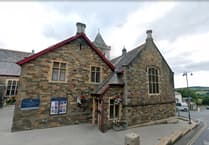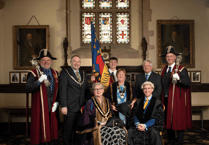A WEST MIDLANDS poet whose exploration of his craft has led him to Cornwall has remarked on the legacy of Charles Causley in Launceston.
Andrew Fentham is the current writer-in-residence at the former home of the late Launceston poet Charles Causley. The residency programme is delivered by the Causley Trust, and this year marks the centenary of the birth of Charles Causley.
Andrew grew up in the West Midlands — Birmingham and the Black Country. He studied English and philosophy as an undergraduate at Leeds and has studied for a Masters degree in creative writing at Newcastle.
He spent time between his degrees teaching English in Budapest. After studying, he wanted to focus on writing, which brought him to Cornwall, and he has been living in Penryn.
He said: “Cornwall has become a bit of a project. That’s why this residency was so appealing. It’s quite an aspirational place and there is a long tradition of artists coming to Cornwall and being inspired.
“This felt like an opportunity to focus up North a bit. To be in a new part of the county is very exciting for me. There’s a very strong sense of identity here.
“Causley’s legacy is a massive part of the identity of the town. If the residency’s still going on in 20 years time it will be really different, but for me and people that came before it’s still really fresh and raw.”
He saw the residency opportunity on social media, having already previously met Charlotte Walker, who was artist-in-residence at Cyprus Well at the end of last year.
He said he felt ‘very fortunate’ to have been selected for the residency — the Causley Trust said the interest and responses for its fifth writer’s residency had been ‘overwhelming’.
Andrew added: “I knew I wanted to respond directly to Causley, to the town and to the area, and North Cornwall in general.”
Andrew had first come across Causley’s poems in school and at college, adding: “I still remember reading Timothy Winters for the first time — the striking imagery and use of language. It’s part of the reason I was interested to come and learn.
“The problem with the representation of Causley is he’s kind of painted into the corner as a balladier, but I understand he was quite aware of everything going on — modernism didn’t just pass him by.”
Of the work of the Causley Trust in the centenary year to try and promote more widely the work of Causley, Andrew added: “People [in Launceston] are quite rightly proud of the legacy. For the type of poetry which he wrote, it’s already well loved, quite direct sometimes. It’s traditional in a way that it does a lot of things people want and expect from poetry.
“He seems a little bit more complex than people realise. There’s a lot of depth there that needs bringing out and exploring and academic attention — and media attention as well.”
Spending time here, he said, has given him new inspiration: “I’ve never been inspired to write about place before, before I came here. This whole place is really inspiring.”
Of Cyprus Well itself, he added: “I’m the kind of person that can be quite solitary. I like the space and time the residency and house can offer. I will be telling anyone I can to do [the residency]. The Causley Trust are doing really great work. It’s important work at this stage when all arts funding is disappearing. A residency like this and the level of support you receive is quite rare.”
Despite living and working in Cornwall since 2015, Andrew had the chance to experience his first St Piran’s Day in the county, at Launceston, reading Causley’s I Am The Song and My Young Man’s a Cornishman during the evening’s celebrations at the Bell Inn.
With not only Causley’s centenary on the radar, Andrew will have a pamphlet of poems published next year through The New Fire Tree Press, tied into the programme of events celebrating the centenary of the birth of Scottish poet W S Graham. Andrew is working towards a collection of translations from Hungarian András Gerevich — as well as poetry, Andrew’s passion is also translation.
Before that, Andrew’s debut pamphlet of poems will appear this year through Eyewear Publishing. He has published poems and translations in magazines and anthologies, including Poetry Review and The Manchester Review.
Although a little apprehensive about delivering his first academic conference in France later this year, he is looking forward to the potential of meeting the people behind The Black Herald magazine, which has been translating and publishing his work for a number of years.
Andrew hopes to make the most of his remaining time in Launceston — he would like to see inside the Castle, which he says ‘looms’ over the town, adding: “I’m keen to see the space,” and said he also hopes to be able to access Lawrence House Museum before the end of the residency. He will also take a trip this week to visit Causley’s archives at the University of Exeter.
He said he will ‘definitely’ be back to Launceston, and will be performing at the Causley Festival this summer.
Andrew has had a mentor during the residency — writer Mac Dunlop, who will also be aiding the Causley 100 celebrations.
Mac is putting together a series of podcasts, which should be available via the Trust’s website soon — these include a recent visit by Portuguese pianist Marcello Montes to Cyprus Well, where he played Causley’s piano, and a meeting of the writing group of Falmouth’s Seven Stars pub at Cyprus Well.
Andrew added: “It’s nice to bring other people into quite a special place — it’s quite inspiring.”





Comments
This article has no comments yet. Be the first to leave a comment.